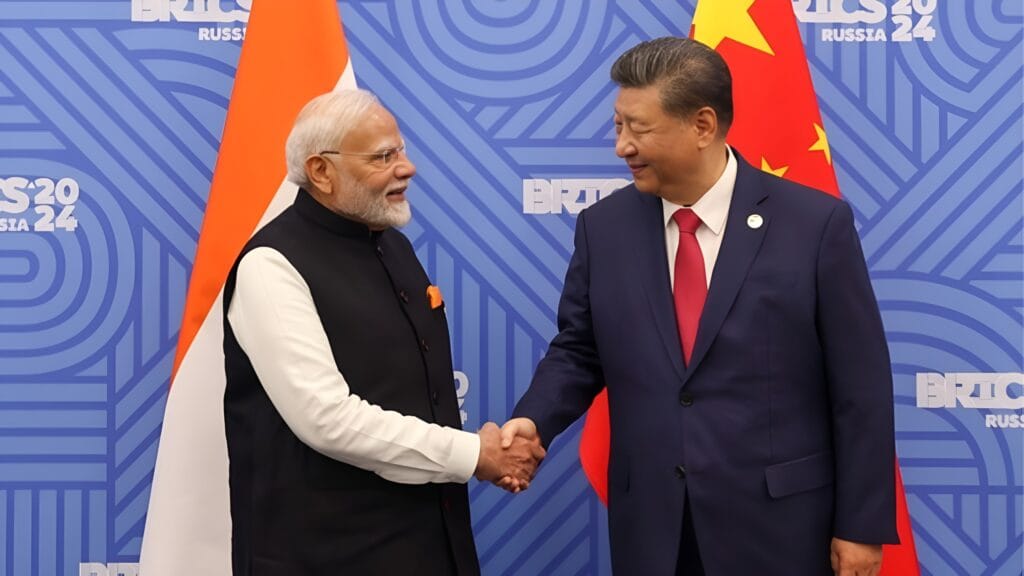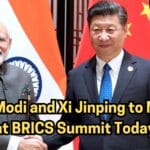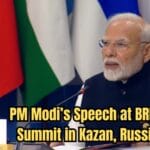A major bilaterally significant meeting between Prime Minister Narendra Modi and Chinese President Xi Jinping on the sideline of the BRICS Summit in Kazan, Russia has marked the first formal encounter between the two leaders after five years, when tensions between the two countries are simmering, especially border disputes along the Line of Actual Control (LAC) in Ladakh. The two leaders talked about the need to maintain peace and stability at the border and strengthen bilateral ties, which both leaders agreed were crucial for their nations and regional and global peace.

Importance of India-China Relations
Prime Minister Modi said the relationship between India and China is important to global peace. His words reflect that both are the world’s most populous countries and steadily strengthening economic giants. The direction in which their relationship sustains stability, particularly relating to borders, reverberates in the region and further in the world at large. India-China relations have been marked by oscillations in the historical trajectory between cooperation and competition at various stages of their interaction. The two countries are old civilizations sharing deep roots but do not help in present-day squabbles over territorial claims, geopolitical influence, and visions of strategic orientations.
ALSO READ | India and China Agree on New Border Patrolling Arrangements: Foreign Secretary Misri
On this occasion, Modi emphasizes mutual trust, respect, and sensitivity as necessary values underlying India-China relations. These three pillars should exist for the smooth management of complex issues, including the oft-contentious issues, in the relationship between the two sides, says Modi. I think this is a very pragmatic approach by the Indian Prime Minister. Trust and respect are mandatory when it comes to solving international disputes. However, mutual sensitivity, especially over contentious issues like territorial integrity, is a tricky one. This will call for both sides to understand the other’s stand without falling into nationalistic rhetoric.
The Border Situation: A Prolonged Issue
The border problem between India and China, particularly at the Line of Actual Control, has indeed been one of the toughest features of their relationship. Since May 2020, when tensions flared up in the eastern Ladakh area, they turned out to be life-shattering for at least 20 Indian troops and an unknown number of Chinese troops in a deadly clash in June of that year. Military tensions have persisted since then, and diplomatic efforts have been undertaken to tone down the situation.
At the Kazan meeting, Modi welcomed the consensus that India and China have just come to regarding the border issue. The Prime Minister referred to disengagement agreements taken up in the last few years and asked for attention not to allow there to be any disturbance of peace and tranquility at the border. This is a step that matters particularly because both nations agreed to renew their military patrols along the LAC, marking a possible end to the four-year-long standoff.
On the other hand, the real question is whether this agreement and the deeds done will settle this protracted boundary dispute. While the consensus agreement over military disengagement has been a welcome development, I still feel it is too soon to pop the champagne. I do believe in necessary temporary disengagements, agreements, and resolutions which are not addressing the issues but are rather hiding the deeper causes of the problem. The border dispute between these two countries is so grave that it features in the political and military strategies of each country; unless there is a long-term mutually acceptable solution to this issue, such flare-ups may recur soon.
Met President Xi Jinping on the sidelines of the Kazan BRICS Summit.
India-China relations are important for the people of our countries, and for regional and global peace and stability.
Mutual trust, mutual respect and mutual sensitivity will guide bilateral relations. pic.twitter.com/tXfudhAU4b
— Narendra Modi (@narendramodi) October 23, 2024A word of caution over Xi Jinping’s response: A focus on cooperation
In his speech, Chinese President Xi Jinping also echoed the same sentiments, accentuating the need for an era of stable and peaceful borders. Xi argued that India and China represent two ancient civilizations, but also two large developing countries. They are important members of the Global South, standing at critical moments in their processes of modernization, and therefore obliges them to dialogue more constructively regarding their differences.
As such, Xi’s thrust on communication and cooperation indicates how China remains keen on managing her relationships with her immediate neighbors, especially one so large as India. Xi’s declarations also seem to indicate that China seeks an arrangement not merely for solving the border question but also for partnerships with India in higher world forums. The invocation of both countries setting an example for the strengthening of strength and unity of developing countries reflects the wider global ambitions of China.
However, one needs to treat these statements with a bit of caution. It is pleasant to hear Chinese leaders talking about cooperation and peaceful engagement; however, their actions on the ground, specifically in the context of the LAC, have more often gone against these statements. The aggressive posture of China along the LAC in the last several years and its aggressiveness elsewhere in the South China Sea, among others, indicate that cooperation will not be the first choice for China, instead, China will choose to pursue its strategic and territorial interests. I believe that even though the rhetoric of cooperation needs to be held up to maintain diplomatic decorum, actual cooperation will depend on how China behaves on the ground, particularly regarding the border situation.
Are the Recent Agreements Going to Help?
Indeed, the agreements on border disengagement are a step in the right direction, but several factors will determine whether these agreements hold and whether India-China relations can improve in the coming years. For example, both nations need to commit to the agreements not just in words but in action. For example, as of recent development, military patrols have begun along the LAC which is a positive sign, but will it be the harbinger of lasting peace?
The two countries would have to continue high-level talks in the short term to ensure that this round of disengagement sets up a broader framework for resolving the LAC issue. Border management agreements worked before but have all been temporary arrangements. What is needed is a permanent, peaceful resolution to the border dispute, and only time will tell if this current phase of diplomacy spells one in the right direction.
The most important challenge will, however, be for the two nations to keep each other’s geopolitical interests in balance. China has become a global power and has its ambitions in the region, which often tend to contradict India’s interests. In the same vein, India is also following the way of economic and military growth and cooperation with other world powers like the US may put it at loggerheads with China. Both countries will probably go on competing for influence in areas such as the Indian Ocean, Africa, and South Asia.
Global Implications on a Deeper Level
India-China relations do not occur in a vacuum. More so, the dynamics involved between the two countries have larger implications for global geopolitics and most particularly in the Global South and emerging nations. The fact is, both India and China are held as leaders in this space, and cooperation would mean a great change for the international world of trade, diplomacy, and development.
India and China can, in combination with others, present robust resistance to the West’s dictates if they can learn to put aside their mutual grievances and join forces on matters of mutual benefit – an easier task for a joint approach under the umbrella of multilateral forums like BRICS and G20. Both are ready to set the world straight on these issues if they can bring issues that have kept them apart on borders, economic policy, international diplomacy, and military strategy on one common platform.
Conclusion
The meeting between PM Modi and President Xi Jinping in Kazan is undeniably a step forward for attempts to mend the relationship soured between India and China. It is just that the initial focus needs to be on continued peaceful borders and mutual trust along with cooperation deepened, but it would be only when the changes are so established permanently by the nature of such diplomatic efforts. The recent agreements on disengagement are a positive sign, but unless both nations put sustained effort into the resolution of the deeper issues at play, we may only be looking at temporary relief from tensions.
India and China are so important not only to the two countries but also to global peace and stability that this meeting should never be ignored. Whether it indeed marks the real beginning of a new phase in their relationship will remain to be seen in the course of action taken by both sides in the coming months and years.
Analysis by Atul Raj






